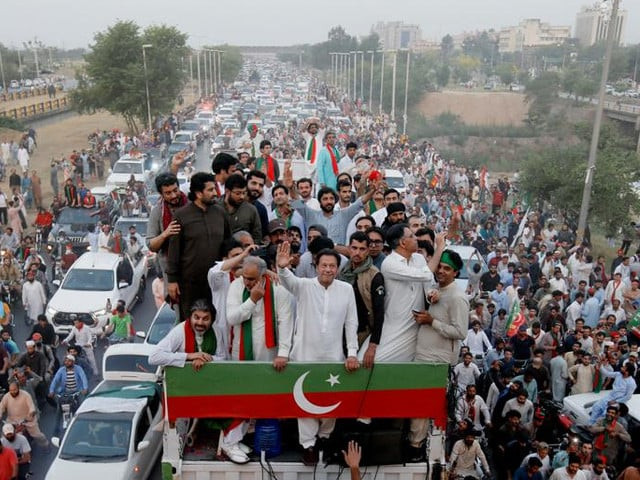Why is Imran not backing down?
Observers fear confrontational politics heading towards ‘dreadful scenario’

He was knocked down but, just like his predecessors, jumped back in the ring and vowed to fight till the end.
In his all-guns-blazing video statement on Friday, wheelchair-bound PTI chief Imran Khan addressed the ruling alliance and the powers that be right from a hospital built in his mother’s name, asserting that he was not backing down and would bounce back on the street once out of the hospital.
Though his party’s long march is temporarily postponed till he is fit to march to the capital again, Imran’s populist rhetoric to take the mighty ones head on in his multi-dimensional conflict with almost all the institutions of the country was of the same intensity. Ballot or bloodshed, he said, were the only options left.
From Nawaz Sharif’s “I will not take dictation” to Yousaf Raza Gilani’s “state within a state will not be acceptable” and from Sharif’s statement that the army has gone from a “state within a state” to a “state above the state”, the concept of a parallel government run by the military is not an alien phenomenon in Pakistan anymore.
Political observers believe that Imran has lately joined the anti-establishment camp but the only difference is that he is simultaneously challenging the government and the powerful stakeholders as he believes that the civilian rulers do not have all the power when they rule.
Moreover, they believe Imran was also trying to give a collective identity to his followers so that they could feel that they matter, their lives have dignity and they are a great nation.
‘Challenging the army’
Eminent scholar Professor Dr Hassan Askari said that confrontation was imminent if one hears what all sides were saying for the past few days or months. Commenting on Imran’s statement a day after he was shot at and injured in a rally at Wazirabad, the professor said Imran was not only confronting the government but challenging the army as he believes they are the real players in the game and possess real power.
Professor Askari noted that Imran has tried to respond to the unprecedented press conference of the top spy chief where the latter accused the former prime minister of excessively telling lies and maintaining a double standard, among other things.
Expressing his inability to predict the final outcome of the ongoing slugfest, the professor feared that things were heading towards confrontation.
Professor Askari felt that sometimes Imran takes a “blinkered view” of the situation that could ultimately create problems for himself and his party, adding that if no middle way was found then things were definitely heading towards a dreadful situation. Amid political volatility coupled with tough economic conditions, he noted, internal chaos was increasing and it was ultimately weakening whatever democracy was left in the country.
However, the professor said that Imran wasn’t doing it for civilian supremacy though he was facing a similar situation that Zulfiqar Ali Bhutto, Sharif, Benazir and several others faced in the past. “It's popular leader versus establishment,” he said, saying Imran has turned against the establishment because it didn’t save him at the time of the no-confidence motion back in April.
For the professor, one way to defuse the situation was to announce the name of the new army chief, especially, when the outgoing military czar has repeatedly said that he won’t take an extension. “It’s indecisiveness on the part of Prime Minister Shehbaz Sharif,” he said, saying he should have announced the name of the new army chief by now for a smooth transition.
Unfortunately, he said, Pakistan was facing a multi-dimensional conflict where elected leaders, the governments, powerful stakeholders, the national poll body, judiciary, and agencies got somehow involved, saying “all institutions are partisan now” and there was a dire need to find a way to avert a political crisis.
Hand-picked or otherwise, political analysts said, the country’s history shows that no premier could complete the constitutionally-mandated term and no army chief could maintain good relations with civilian rulers for long.
No matter how the political scenario is framed, they said, it actually is about the appointment of the military chief and having cordial relations with the establishment that all political parties are looking forward to. Despite his hard-hitting statements and identity entrepreneur, Imran is no exception.



















COMMENTS
Comments are moderated and generally will be posted if they are on-topic and not abusive.
For more information, please see our Comments FAQ